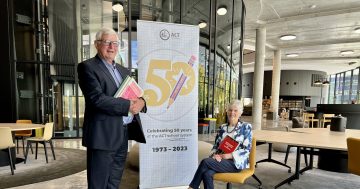For reasons best known to myself, although a therapist may have some ideas, I searched out the website for the ACT Board of Senior Secondary Studies (www.bsss.act.edu.au). OK, I was trying to work out how ACT Year 12 results are calculated and to consider whether an acquaintance who sends his sons to Boys Grammar, at vast expense, because it doesn’t use the ACT system is a dope or a serious thinking type person.
The system described looks like hocus pocus to me. If I have read it correctly, a ranking is given only to students who compete for it, by doing tertiary-related courses. An individual’s subject ranking is based on results within a school, driven towards consistency only by a consultative moderation process. There is a bias to continual assessment. Then there’s a test across the ACT that bears no necessary resemblance to any subject done by any student, which is used to allocate rankings to schools (not students). Then the schools allocate the rankings to students. Oh, and the whole thing is somehow cross-run against the NSW tertiary entrance system, notwithstanding that it’s nothing like it and Canberra has nothing like the range of conditions that NSW has.
The system looks to allow for massive fiddling within schools – if you move poorer students out of tertiary subjects, you do better. It looks to disadvantage those who do better in exams than in continual assessment, even though it’s about getting people into tertiary education that still relies heavily on exams. It seems to mean that a student’s result might bear no direct relationship to how he or she did in any or all subjects or in the aptitude test. And it seems to allow no-one (the student or the school) to be responsible for a poor result.
So, does it make any sense to people who have a clue? I mean teachers and statisticians, and current Year 11/12 parents – I’m none of the above. Is there a better explanation around?




















